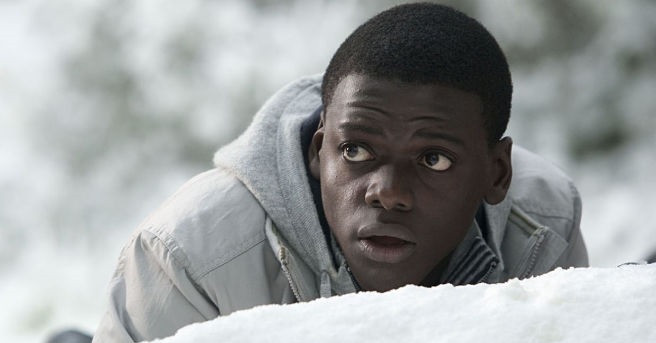Black Males Can’t Get Out
 Jordan Peele has directed and produced a new movie called Get Out that touches on many of our greatest fears. But get this.
Jordan Peele has directed and produced a new movie called Get Out that touches on many of our greatest fears. But get this.
In this movie, the interracial couple, Chris (Daniel Kaluuya) and Rose (Allison Williams) are preparing to visit Rose’s parents for the first time. Her parents live in a predominantly white neighborhood, where many black men have gone missing. On their drive up to the house, the couple has their first encounter with prejudice, of course, with the police. The officer asks for a driver’s license from Chris, although he wasn’t even driving the car. (Does this sound familiar?)
With heightened anxiety, he is introduced to the parents along with Georgina and Walter, the two black caretakers hired to help around the house. The caretakers, of course, creepily stare at Chris from windows and hide in dark shadows, giving him clues that there might something seriously messed up in this town. When he tells Rose they need to leave, it’s too late, and literally everyone goes crazy and tries to kill him.
This film is obviously dramatized, but Peele touches on the feelings many black people encounter in predominantly white spaces. Often, feelings of discomfort and oppression surface when people of color feel the impact of being a minority. People of color are often forced to be hyper aware of their mannerisms, speech, movements…you name it, especially when they’re trying to make a positive impression on say, their significant others’ parents. Even in the 21st century, it is commonplace for black individuals to be misconstrued or misinterpreted amongst non-black crowds. Presumptions on colored people have tainted the minds of society and the prejudice that Chris experiences hits home for many races. Black individuals are predisposed to judgment even outside of the film’s setting of white neighborhoods.
Peele’s film comes at a time when these themes are finally being exposed to the public. Just in 2016 alone, over 230 black civilians have been killed at the hands of the police. And that number isn’t stopping anytime soon. With movements across the U.S. exposing the insecurities and threats felt by the black community by white people, Peele hits the nail on the head.
Get Out also sparks conversation around biracial couples and racism in the media. Peele’s use of a black man as one of the main characters, and especially as a character that the audience sympathizes with, is unfortunately nearly impossible to find in the horror genre. Peele’s symbolism goes beyond whispers behind a black man’s back or micro-aggressions layered in racism. Instead, Chris stares prejudice directly in the face, portraying in the film the very real fear that black men have in response to the racist portrayals of them.
With the ongoing police brutality and killings of black individuals in the United States, Peele encourages audiences of all backgrounds to confront the racial issues that are still very present in 2016. Peele has found a very unique way to further progress this discussion and expose viewers to the realities of another culture.
